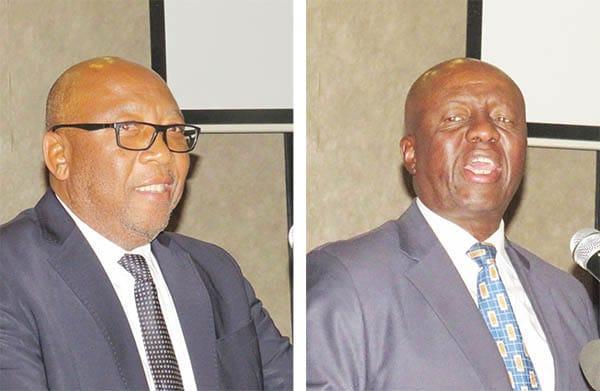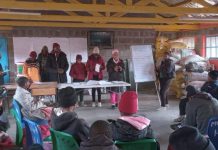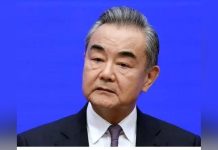Africa-Press – Lesotho. The drive to revamp the country’s creaking democratic institutions was escalated this week when political leaders met to peruse through the findings of outreach teams and expert opinions on key thematic areas.
Lesotho’s political leadership assessed consultant reports on the seven areas earmarked for reforms to determine if all the consolidated opinions and expert recommendations reflect Basotho’s views coined under the theme “The Lesotho We Want”.
The seven reports compiled under the auspices of the country’s reforms programme by legal and security experts, among others, are a consolidation of Basotho’s opinions on changes they envisage for the constitution, parliament, the judiciary, as well as public service, security, the economy and media sectors. The reports were attained through intensive in-district consultations conducted early this year.
Speaking at yesterday’s official opening of the National Leaders’ Forum (NLF), Minister of Communications, Science and Technology, Chief Thesele ’Maseribane, expressed satisfaction that all the experts engaged to consolidate and assimilate Basotho’s views were locals as which gave the process credence and testimony the reforms were Basotho-driven.
“We meet again today to advance further the reforms journey that Lesotho has embarked on, concerned with seven thematic areas being the Constitution and Parliament, as well as Judiciary, Security, Public Service, Economy and Media sectors,” ‘Maseribane said.
“We are very grateful for these expert reports and I must say on my part that I am content in my heart because the reports consolidating Basotho’s views were compiled by Basotho nationals.
This is indication that we have experts from various fields in Lesotho. ” He added: “It is also clear that these reforms are being driven by Basotho in order to attain the Lesotho we want and its development. We need to hold hands, be of one voice and vision, for then nothing can stand in our way. ”
Also present at the high table were the Special Envoy to the SADC Facilitator to Lesotho, retired Chief Justice Dikgang Moseneke, members of his entourage including moderator Ellen Molekane, as well as Dr Ntoi Rapapa who is the new Minister of Energy.
The floor was dominated by political leaders including PFD’s Adv. Lekhetho Rakuoane, LCD’s Mothetjoa Metsing, DPL’s Limpho Tau and NIP’s Kimetso Mathaba, among others.
‘Maseribane said, “to get to this point has not been an easy journey” and further expressed the need to “approach these reforms neutrally and selflessly”.
“I want to take a walk down memory lane and remind each of you where this journey started, as well as he detours we have passed through.
It is imperative that government reports back to Basotho on the challenges encountered in our reform journey to get to this point where we are implementing the reforms,” ‘Maseribane said.
“Government is doing this to enlighten Basotho about the reigning situation in the country and this we do without the intent to embarrass anyone.
We only want to state facts without any bias. “We will recall that we are counting on these reforms to help us attain lasting peace, stability, security and economic development for Lesotho.
These reforms are blind to our political affiliation, or any other inclinations. “These reforms are above everything and everyone, hence our approach should be neutral and selfless. As government we undertake to ensure that nothing will taint this process,” he added.
On his part, Moseneke also acknowledged the experts’ contribution to the progress made thus far and the ease with which they had consolidated Basotho’s views in a manner that was “assimilable and easy to absorb”.
“We have met here many times before. But the good news now is that we are so close.
I would like single out the experts we have engaged, to engage with Basotho’s views which we gathered from different sectors and parts of the Kingdom, to process and synthesize them; and make them assimilable, easy to absorb,” Moseneke said.
Justice Moseneke further noted that “for the first time we are talking substance”. “And these experts have done quite a wonderful work and I hope all of you have had the opportunity to engage with their reports.
For the first time ever, today we are talking substance,” Moseneke said. “Today we are going to listen to you tell us your response to the reform analysis and proposals that are before you.
So, the meeting will be directed by you (leaders and stakeholders). We have come to that point where we are at the river and must drink the water. ” Moseneke warned Basotho that there was no turning back and that “we are there and there is no place to hide” adding that it was time they confronted issues they may have been avoiding.
“We have to talk about those things that you say Basotho ought to change. But we have suggested that we do all the thematic areas over two days.
We trust and hope that you have read all the material before you, both the background as well as the synthesis that has emerged from the experts that we have engaged,” Moseneke said.
“It is going to be an opportunity to be able to say what your position is on, for example, the first area which is constitutional reforms. Each of the formations will say what their preliminary responses are to the substantive questions. ”
He also announced a follow-up NLF where they would be finalizing their analyses of the experts’ report and adopting them in order to move to other phases of the reform programme.
“We have another NLF next week. So we are preparing ourselves by confronting these issues. We hope to finalise them properly and adopt them, you having heard of others.
It is also an opportunity to hear what the response of other stakeholders is,” Moseneke said. “And you may modify and adjust your positions in relation to that.
If you remember the original request was that all stakeholders filed their responses in writing to me so that we would help to synthesise them and have a chat that shows areas of convergence and areas of divergence.
The retired judge told the meeting that it was imperative for all stakeholders, as they deliberated on the reports, to narrow their differences in a manner that areas of consensus and disagreement were visible.
“A well-known technique is knowing what people agree on and what they disagree on and finding a process through which to narrow the differences.
The time has come for you to tell us and to respond because all the work has actually been done,” Moseneke said. “And I hope all of you are ready to be able to do that.
And if you are not ready, I hope you will be ready to tell us when you are because we have got there now. We have got to the substance. You must look the substance in the eye and try to generate responses.
” He added: “So, today we are going to talk about the substance starting with constitutional reforms. And today still, we hope to reach parliamentary, judiciary and security sector reforms. Then we will proceed to other areas the following day, after which we will proceed to the National Reforms Authority Bill, 2019. ”
The reports make recommendations ranging from the constitution where they propose the abolition of the Office of First Lady as it was not provided for in the constitution hence it was a waste of public funds which should not have a budget allocated.
They add that the same office could be held by the Queen as Lesotho is a monarchy but that it would still serve no purpose as the Queen is not recognized by the constitution.
On the sore topic of prorogation and dissolution of parliament, the report on the constitution proposes that the Prime Minister’s powers to dissolve parliament when he loses a no-confidence vote should be curtailed, that a vote-of-no-confidence be invoked only after three years into the life of parliament.
Instead, the reports propose that a Prime Minister should be subjected to impeachment in case of misconduct and that instances of misconduct should be prescribed, in pursuit of protecting parliament’s life which is a constitutionally prescribed five years.
The reports further propose limited powers for the Prime Minister in the appointment of the heads of key institutions such as the judiciary and security agencies.
For More News And Analysis About Lesotho Follow Africa-Press






